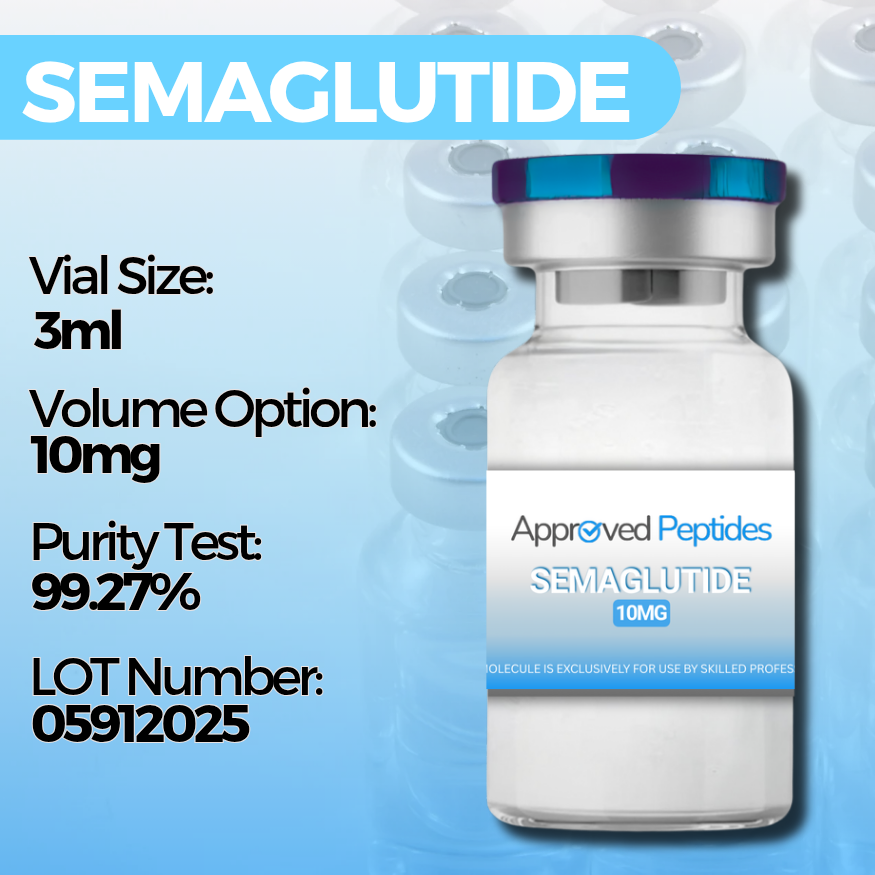Approved Peptides are intended for licensed medical professionals and experienced researchers. Reconstitution required. Dosing and use instructions are not provided.
Sema 10
Sema 10
Couldn't load pickup availability
Semaglutide – Research Peptide Review
Background and Development
Semaglutide is a synthetic analog of glucagon-like peptide-1 (GLP-1), a naturally occurring incretin hormone that regulates blood glucose and appetite. By modifying the structure of GLP-1, scientists created a compound with dramatically extended half-life (about 7 days), making it one of the most effective and durable GLP-1 receptor agonists available for research.
Originally developed for type 2 diabetes, Semaglutide has since become a major focus of investigation in obesity, metabolic disease, and cardiovascular health research, due to its profound impact on weight reduction, insulin sensitivity, and appetite regulation.
Research Applications and Benefits
Preclinical and clinical studies suggest Semaglutide has wide-ranging effects in metabolic and obesity-related research:
-
Weight Management
Semaglutide reduces appetite and caloric intake through GLP-1 receptor activation in the brain, making it one of the most effective investigational tools for studying weight loss pathways. -
Blood Glucose Control
By enhancing insulin secretion and suppressing glucagon release, Semaglutide supports research in type 2 diabetes models and metabolic health. -
Cardiovascular Benefits
Research has demonstrated improvements in cardiovascular outcomes, including reduced risk of major cardiac events in high-risk populations. -
Liver Health
Semaglutide is being studied for its ability to reduce fat accumulation in the liver, making it a peptide of interest in non-alcoholic fatty liver disease (NAFLD) and NASH research. -
Longevity and Inflammation
Emerging studies suggest GLP-1 analogs may exert beneficial effects on systemic inflammation and longevity-related pathways, expanding their significance beyond glucose and weight regulation.
As with all peptides and analogs offered for research purposes only, Semaglutide is not approved for human consumption unless prescribed in approved clinical use.
- Stability – Typically supplied in lyophilized form for stability; should be stored in a cool, dry environment until reconstitution.
- Regulatory Status – Semaglutide is FDA-approved under brand names for type 2 diabetes and obesity management. However, all other uses remain investigational, and research-grade Semaglutide is not approved as a supplement or therapy.
- Research Integrity – Studies must be conducted under strict laboratory protocols in compliance with ethical and regulatory standards.
Semaglutide represents one of the most transformative research compounds in metabolic health, with applications in weight loss, glucose regulation, cardiovascular resilience, and liver health.
Its long half-life, potent appetite suppression, and systemic metabolic benefits make it an invaluable research tool for understanding the biology of obesity, diabetes, and chronic disease prevention.
Share


